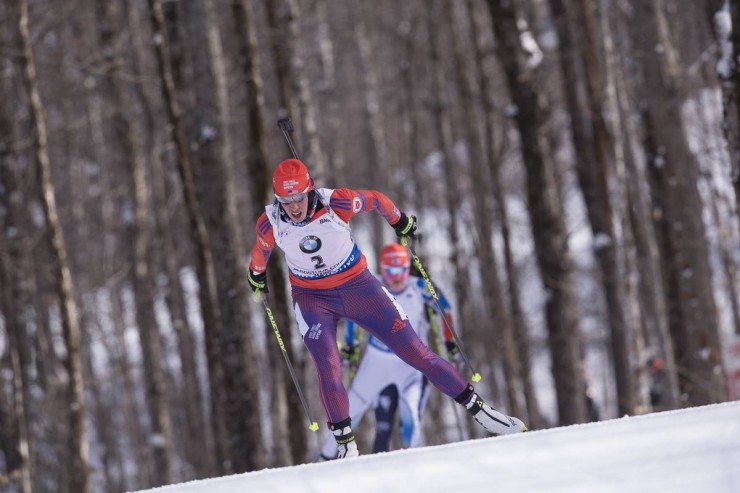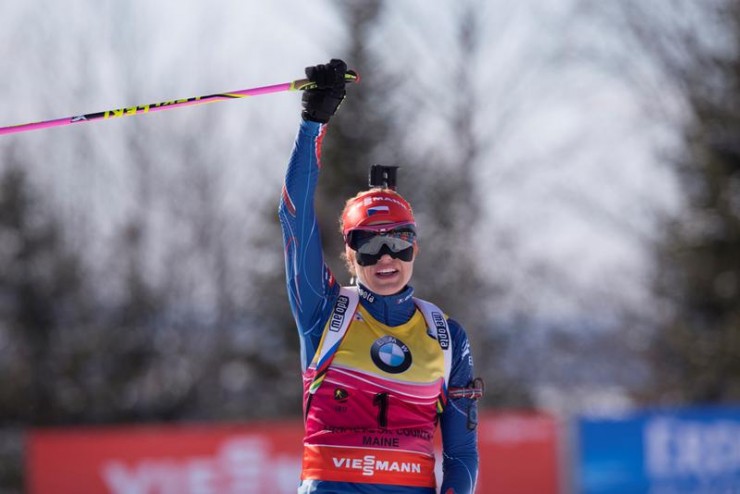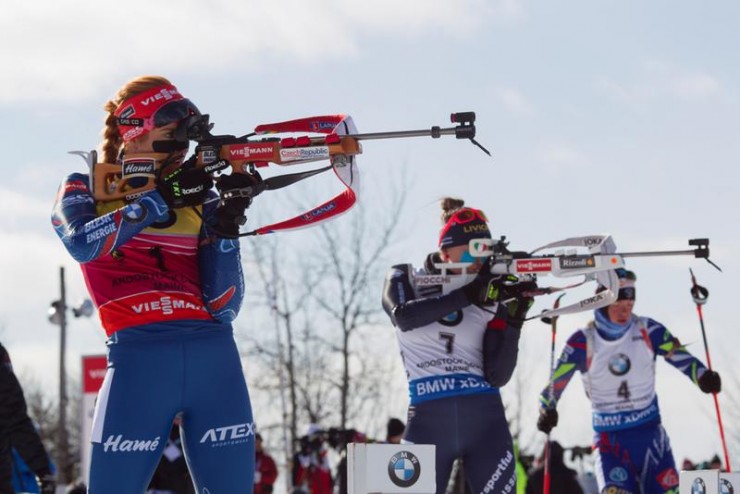
When Susan Dunklee woke up Friday on a sub-zero morning in Presque Isle, Maine, it took her a moment before her eyes focused in on a shiny new object on a table in her room. Oh yeah, my silver medal, she thought.
“I had forgotten,” Dunklee said on the phone Friday evening, after her second of two IBU World Cup races in Presque Isle. The 29-year-old U.S. biathlete, who turns 30 on Saturday, had placed second in the sprint on Thursday to tie the best result by an American in a biathlon World Cup. It was a surreal moment back then, and even now, it was still sinking in.
But she had to move on. Dunklee had a pursuit ahead of her, one in which she’d start closer to the race leader than she ever had before.
“I knew for today, I had to set that aside and enjoy it for what it was and know I’ll have that to cherish for the rest of my life,” she said. “But today I had another race and another great opportunity in front of me.”
One of three US Biathlon skiers in the women’s 10-kilometer pursuit, Dunklee started second, 18 seconds behind Gabriela Soukalova of the Czech Republic, who led the 60-woman field out in first. Soukalova had been the only woman faster than Dunklee in the sprint, beating her by 17.8 seconds.
And so she started first, but was in danger of being penalized for jumping the start. Soukalova quickly realized her mistake in starting too soon, and hesitated briefly before continuing on her first of five loops. She wasn’t penalized, and Dunklee — who had a front-row view of the slipup — said it was kind of comical.
“I had a good laugh at that, actually,” Dunklee said. “Normally, fifteen seconds or eighteen seconds before I’m starting, I’m very focused and I’m looking down the track and trying to stay serious and focused. But it was funny, Gabby started off and I think she wasn’t sure if she was supposed to go yet or not, so she stopped and came back, and she just looked very confused. Sometimes it is nice to have something silly like that to lighten the mood.
“I can kind of understand why it happened because we are used to being at venues where there’s a huge stadium with people roaring and counting down, ‘Ten, nine, eight, seven…’ ” Dunklee explained. “And it was so anticlimactic that way, it’s just like, ‘Oh, there’s a clock, and it’s at zero. It’s time to go.’ ”

Off went Soukalova, the overall World Cup leader, cleaning two consecutive stages before having some trouble on the range on a windy, 8-degree Fahrenheit afternoon at the Nordic Heritage Center. She led up until that point, while Dunklee hung in second through the first loop and first shooting stage, after starting 1 second ahead of Poland’s Krystyna Guzik, the third starter, and 2 seconds ahead of France’s Marie Dorin Habert in fourth.
“My plan for the first loop was to let the girls behind me lead because they are very strong skiers and I often ski more efficiently behind people,” Dunklee explained. “But they never came up alongside of me and tried to pass, so I wasn’t just going to stop and pull over, you know? I ended up holding on to second coming into the first shooting, which had not been the plan, but it was fine.”
There, rather than think about what could be — the possibility of winning or another podium — Dunklee focused on the four simple words she uses to get into the ideal mindset for shooting.
Open. That involves breathing, opening her “ventilation system, opening my eyes and seeing what’s going on in the range, what the wind flags are doing, opening my snow covers,” she explained. “The importance of a good key word is it’s one word that can cover a lot of things that you need to be done in an instant.”
Relax. “Take my rifle off my back, try to keep my movements smooth and relaxed, changing the clips quickly but relaxed, setting up, getting a good tripod sort of feeling with my body with my rifle sitting on top of it,” she said.
Set. This is what she thinks about when getting ready to shoot. “Set means ready. It has a feeling of readiness. My finger is set on the trigger, taking 90 or so percent of the trigger pressure so all I have to do is squeeze it very gently for the shot to go off,” she said.
Quiet. Once on target, that’s all that goes through her mind. “I’m trying to quiet my mind so it’s a very narrow thought focus,” she said. “Feeling quiet with my body, being quiet on the target and being quiet after the shot goes off as a good follow through.”
Dunklee nailed her execution on the first prone stage and cleaned all five targets to leave the range in second, 11.5 seconds behind Soukalova. Italy’s Dorothea Wierer, the seventh starter, cleaned as well to move into third, 8.3 seconds behind Dunklee. Guzik and Finland’s Kaisa Mäkäräinen, in bib 5, cleaned as well to hang close in fourth and fifth, respectively, about 2 seconds behind Wierer, while Dorin Habert missed one to drop to seventh, another 20 seconds back.
One loop later, Soukalova — still skiing alone — hit every prone target to leave the range again in first, 11.7 seconds ahead of Wierer, who quickly cleaned her targets to move into second. Dorin Habert cleaned to take hold of third, 35 seconds behind Soukalova, while Dunklee had one penalty to slip to sixth, 44.6 seconds out of first.
According to Dunklee, the wind was much more variable for the second stage.
“The first shot the wind was strong, but I could see the wind dying down and I did what we call shading,” she said. “Instead of taking clicks to correct, you aim a bit off the center of the target so you correct with your aiming. It takes a bit more skill in a way and is riskier, but it is very useful in situations that the wind is fading.”
Despite over-shading, aiming too far off the target on her last shot, Dunklee was pleased to leave the range with one penalty.
“I was really happy with where my head was at that whole process,” she said. “In the middle of the race, I was thinking, this is fun, this is a game, this is a challenge, I got this. And I wasn’t afraid of messing it up. That is a pretty novel and cool mental place to be in a high-pressure situation for me.”

On the third shooting — the first standing stage, things got interesting. Soukalova missed three, Wierer missed three, and Dunklee took her time to hit three of five targets for two penalty loops, which put her in third, 21.5 seconds behind Wierer, who had taken the lead.
“My legs started to shake and maybe I started to be afraid of the wind because it was a little bit stronger than before,” Soukalova said in a post-race press conference. “Sometimes it happens.”
“There was significant wind and it was changing,” Dunklee explained. “It would catch your body and rock you. I think you saw all the athletes waiting for the gusts to subside. I tried to take shots in between them and I missed a couple.”
The penalty loop in Presque Isle is unique in the fact that the ski lodge blocks the view of other racers in the loop. Dunklee couldn’t see Soukalova or Wierer, and didn’t have much of a sense where she stood until she received splits back out on course that she was still in the mix for a podium.
“You are usually not that high up after missing two in a pursuit, but it was tricky conditions and everyone was missing,” she said. “You can never give up a biathlon race because these things happen.”
Ahead of her, she could see both Wierer and Soukalova, in second by 2.3 seconds leaving the range. About four seconds behind Dunklee, Mäkäräinen moved into fourth with two misses, while Dorin Habert dropped to 10th, 49 seconds out of first, with four penalties.
“In the middle of the race, I was thinking, this is fun, this is a game, this is a challenge, I got this. And I wasn’t afraid of messing it up.” — Susan Dunklee, on the tricky shooting conditions during Friday’s pursuit
Mäkäräinen passed Dunklee on an uphill and led her into the range for the last time, positioned in third and fourth, respectively.
“It was really helpful,” Dunklee said of catching a ride off Mäkäräinen. “She is a good skier and I ski more efficiently when I am behind someone.”
By the final standing stage, the wind had subsided comparatively. Wierer once again shot quickly but missed three to fall into eighth place (and eventually finish ninth), while Soukalova cleaned to regain control of first. Mäkäräinen hit all of her targets as well to jump into second, 25.6 seconds back with 2 k to go, and Guzik cleaned to move back into third (after one penalty in the second stage, and two misses in the third stage), 39 seconds behind Soukalova.
Dunklee missed one to leave the range in fourth, 11 seconds behind Guzik and 1.7 seconds ahead of Dorin Habert in fifth. After a rocky previous stage, Dorin Habert took a pause before her final shot of the day to clean the all five targets.
On the final loop, Soukalova charged ahead to secure her 12th World Cup win (and fourth of the season) in 31:24.6 minutes, 34 seconds ahead of Mäkäräinen in second. Dorin Habert charged past Dunklee to take hold of fourth, then picked off Guzik as well to claim third (+38.8).
“It was not in my plan to have five penalties,” Dorin Habert, who ranks second to Soukalova in the overall World Cup, said in the press conference. “The coach told me after the last shooting that I had a chance to catch the podium. I felt good today and I made it.”
“It is awesome like yesterday,” Soukalova said of her second-straight victory in Presque Isle. “Maybe the atmosphere it a little bit easier than Europe, for example, there’s a lot of spectators. … It’s not so noisy and maybe it helps us.”
Guzik finished five seconds later in fourth (+43.9) and Dunklee placed fifth (+56.9) for her best-ever pursuit finish and second-best result of the season.
“I was happy to still be in the fight coming out of that loop,” Dunklee said. “Marie Dorin was right behind me and I hung with her for the first hill after she passed me, but she took off and I didn’t have that sort of gas today.”
Would she have liked to clean that last stage and fight for an even better result? Yes, but Dunklee said she had a plan, she executed it, and she could feel proud about that.
“Today my skiing felt good and felt strong, it felt a bit flat though,” she added. “I think there is still some peak form not there yet, but this is exactly where I want to be sitting going into Oslo [World Championships]. Having some great results here to feel really confident, but also knowing there is a little bit more.”
After one more race day in Presque Isle, the men’s and women’s relays on Saturday, the IBU World Cup will take a break until the 2016 World Championships in Oslo from March 2-13.
Dunklee will team up with Hannah Dreissigacker, Clare Egan and Annelies Cook in the women’s 4 x 6 k relay, which starts at 4:10 p.m. Eastern time on Saturday.
Egan 23rd, Dreissigacker 24th
According to both Dunklee and US Biathlon CEO and President Max Cobb, the U.S. women’s team had one of its best days in recent memory in the pursuit, with three in the top 24.
Egan improved from starting 32nd to finish 23rd (+2:34.0), with three penalties (0+1+1+1), and Dreissigacker placed 24th (+2:41.6) after starting 27th and missing three as well (0+2+1+0).
“I started about 5 seconds behind a big pack including Hannah, so from the start I had my eyes on the orange and purple,” Egan wrote in an email, referring to the US Biathlon team suits. “I caught her pack as we came into the first shooting.”
There, both Dreissigacker and Egan cleaned to move into 22nd and 23rd, respectively, about 1 1/2 minutes behind the leader. The two had to make some major adjustments on that prone stage after zeroing, or setting their rifle sights before the race, on Point 2 — where their teammate Dunklee was slotted based on her start position.
“Cleaning the first prone stage was a major accomplishment for Hannah and me,” Egan explained. “We zeroed our rifles on point 2, where there was strong wind, and then came into the shooting range for the first prone stage on points 29 and 30 — the opposite end of the range and there was no wind. We both took around 8 clicks, which translates to the entire width of the prone target. When I hit the first target I knew I had taken the correct amount of clicks and I was so psyched!!!”
Dreissigacker and Egan skied three of five loops together, with Egan passing her teammate on the second loop. After the second prone stage, Egan left the range in 18th with one miss, about 40 seconds ahead of Dreissigacker, who missed two in that stage to slip to 30th.
“On the last lap I knew she must have cleaned the final standing because I could hear our fans (!!) yelling both of our names on our last lap,” Egan wrote of Dreissigacker. “She was right behind me in the finish.”
With her best shooting in a four-stage race, Egan explained that she was satisfied.
“I did miss my 20th shot and I could have been in the top-20 with a clean last stage, so that is a bit of a let down but I can learn from this and hit it next time,” she added.
“It was fun to ski a lot with Clare,” Dreissigacker wrote in an email. “We were pretty close together for the first two loops, and then I had an extra penalty loop and got behind but then we were really close again for the last lap–I tried to catch her but couldn’t quite do it!
“I am very happy with my race today and really proud of our performance as a team,” she added. “And once again the wax techs and coaches did a really stellar job with the skis and support out there.”
Canada’s lone woman in the pursuit, Zina Kocher placed 46th (+4:36.5) after starting 42nd, with five penalties (2+1+0+2).
On Saturday, Kocher will ski the first leg for Canada’s relay, followed by Emma Lunder, Audrey Vaillancourt and Erin Yungblut.
Alex Kochon
Alex Kochon (alexkochon@gmail.com) is a former FasterSkier editor and roving reporter who never really lost touch with the nordic scene. A freelance writer, editor, and outdoor-loving mom of two, she lives in northeastern New York and enjoys adventuring in the Adirondacks. She shares her passion for sports and recreation as the co-founder of "Ride On! Mountain Bike Trail Guide" and a sales and content contributor at Curated.com. When she's not skiing or chasing her kids around, Alex assists authors as a production and marketing coordinator for iPub Global Connection.



